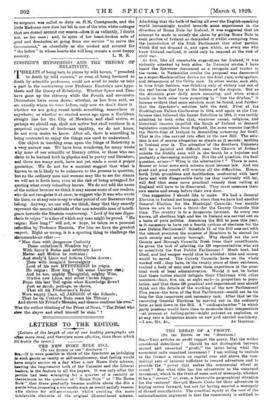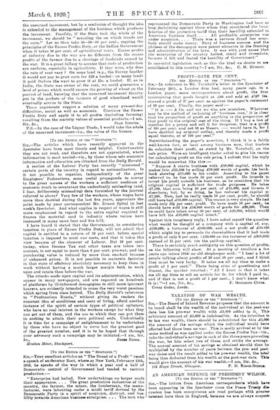THE DREAD OF A PROFIT.
LTo THE EDITOR OF THE " SPECTATOR.]
Sne,—Your articles on profit suggest the query, Has the writer considered definitions ? Should he not distinguish between earned and unearned " profit," the latter being what the economist calls unearned increment ? I am willing to include in the former a return on capital over and above the com- mercial rate of interest sufficient to reward adventure and to provide the " power that makes the commercial wheel go round." But what title has the adventurer to the unearned increment, which is the fruit of some sort of monopoly, whether it he a "corner," or, even, a favourable geographical situation for the venture? Reward Messrs. Coats for their adventure in buying cotton forward, but not for having secured a monopoly of thread manufacture. The essential equity at the root of the nationalization argument is that the community is entitled to
the unearned increment, but by a confusion of thought the idea is extended to the management of the business which produces the increment. Possibly, if the State took the whole of the increment, we should be " muzzling the ox which treads out the corn." Let us then take 50-60-80 per cent., copying the principles of the Excess Profits Duty, or the Indian Government when it takes 50 per cent. of agricultural rents. Excess profits of industry due to the war are no different from the excess profits of the farmer due to a shortage of foodstuffs caused by the war. It is a great fallacy to assume that costs of production are uniform, especially in agriculture. If they were, why does the rate of rent vary F On some land (e.g., the Surrey heaths) it would not pay to grow corn for £20 a bushel : on many lands it paid (before the war) to grow it at 25s. a bushel. If, as in India, the State was owner of the rent, we could guarantee a level of prices which would ensure the growing of wheat on the poorest of land, knowing that the unearned increment thereby put in the pockets of the farmers of good wheatland would eventually accrue to the State.
These arguments suggest a solution of many present-day difficulties, social as well as economic. Continue the Excess Profits Duty and apply it to all profits (including farming) resulting from the scarcity values of essential products.—I am.
Sir, &c., OLIN IN DIC08. P.S.—In the case of the Liquor Trade, I would take the whole of the unearned increment—i.e., the value of the licence.











































 Previous page
Previous page